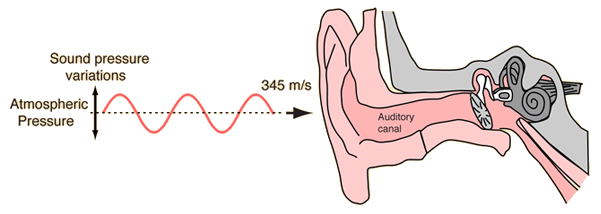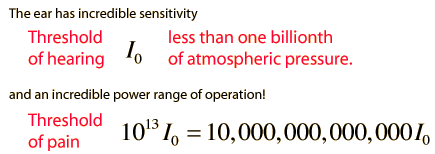Threshold Of Pain
Threshold of Pain
What is Threshold of Pain?
In brief, threshold of pain is the MINIMUM sound INTENSITY at which an individual starts to feel pain. One main component of pain is its subjectivity, meaning that a stimulus to two individuals can result in two different reactions. So what could be painful to one person, can be less so to another.
General Overview of Human Hearing:
In humans, hearing is performed primarily by the auditory system. Vibrations are detected by the ear and transduced into nerve impulses that are perceived by the brain (primarily in the temporal lobe). Frequencies capable of being heard by humans are called audio or sonic. The range is typically considered to be between 20 Hz and 20,000 Hz. Frequencies higher than audio are referred to as ultrasonic, while frequencies below audio are referred to as infrasonic. 
Threshold of Pain: In Hearing (Sound):
To supplement the idea that the threshold of pain, and pain in general, is a purely subjective matter, we can take a look at the concept of sound and the threshold of pain with sound. In sound, the pressure at which a particular sound becomes painful to the listener is called the pain threshold of sound. It only takes a minimal change in frequencies (or intensity? - explain otherwise it's ambiguous) to evoke the pain level of sound, however, there are major differences between age groups.
The dynamic range of hearing in the human ear is capable of responding to the widest range of stimuli of any of the senses. The practical dynamic range could be said to be from the threshold of hearing to the threshold of pain. Therefore, what contributes to this difference, for example, is the highly effective protective mechanism the ear provides during young age. However, this efficiency decreases with age, and constant exposure to high volumes of sound can lead to hearing impairments.

| Threshold of Pain | |
|---|---|
| Sound pressure level | Sound pressure |
| 120 dBSPL | 20 Pa |
| 130 dBSPL | 63 Pa |
| 134 dBSPL | 100 Pa |
| 137.5 dBSPL | 150 Pa |
| 140 dBSPL | 200 Pa |
The highest tolerable pressure caused by sound differs from person to person, but on average, it ranges between 120dB SPL to 138 dB SPL (Table). At this point, the average individual may report an uncomfortable sensation in his or her ear, such as a “tickle”, or a sharp “pricking” in the inner ear. At this point, we can evaluate the upper limit of the threshold of sound, and from it calculate the threshold of pain. Again, we have to note the different variables that play a role in this topic, such as different age groups, different tolerance to pain, gender differences, and many more.
Reference:
http://en.wikipedia.org/wiki/Threshold_of_pain http://en.wikibooks.org/wiki/Acoustics/Threshold_of_Hearing/Pain Collage Physics, S.W 8th edition.

